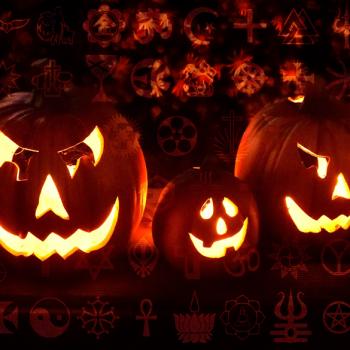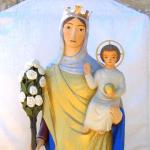
Despite objections from his family and every government website, Jared Woods visited Israel/Palestine during the peak of the war (November 2024). Here is his account of the Holy Land, where newfound political education and spiritual elation are tested under the scrutiny of his peers.
Losing Friends
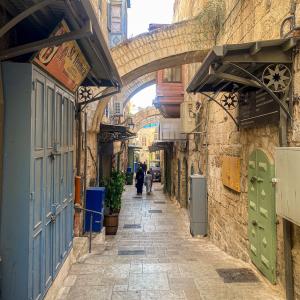
“If your ‘bravery,’ essentially cosplaying a threat to your life while actual people are being slaughtered and massacred with no end in sight, makes you feel better about yourself, then cool. I think this is f*ing lame and disgusting no matter how you justify it to yourself.”
This comment followed my Facebook announcement that I had arrived in Jerusalem, the latest stop in my six years (and counting) of travel. The commenter was an old schoolmate I’d known for three decades, now lost when their anger culminated in the deletion of me from their friend list. Contrary to their statement, I’ve never referred to myself as brave. But I understood everything they said.
My friendship group are overwhelmingly pro-Palestine. I am grateful for this fact. I’d struggle to be associated with any other standpoint. When it comes to warfare, my general rule is that whoever is murdering the most innocent people is in the greater wrong. In the majority of cases, those stats tend to sway from one side to the next. But in this particular conflict, there is no arguing that Israel has flooded their hands with blood. On the date I posted this article, the Gaza death toll numbers were estimated to be 43,300, 70% women and children. And rising.
If I may, I’d like to hover around this point for a moment. As it goes on, this piece will propose many thoughts guaranteed to cause discomfort to both sides. But whatever prods at your convictions, it is imperative that you remember my stance on this specific topic. I sincerely oppose what is happening in Gaza. I find it impossible to quantify the horrors, and nothing I say is any justification for how the war got here.
On that token, however, the war has got here, and I can recognise the steps preceding the fall into this mess. As with most things, the issues stem from complications that were never fully one-sided, and anyone who thinks otherwise exists in a feedback loop of confirmation bias.
Unpopular Zionism Opinion
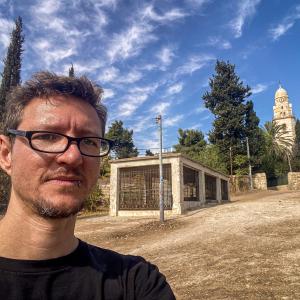
The core argument of who rightfully deserves the land is an excellent example of our complexities. Some people are 100% on the side of Palestine, others 100% on the side of Israel. If you are committed to one of these parties as the sole proprietor, then there is nothing I can say to you. The conversation ends there. However, if you know your Israeli/Palestinian history—from pre-Islamic Torah promises to the Roman conquest, from 7th-century Arab dominations to 11th-century Christian crusades, from the Ottoman Empire to British rule, and, of course, the Holocaust—then you’ll comprehend the murkiness of any clear-cut answer.
From my perspective, Zionism was a beautiful idea that was brutally executed without compassion. An escalation of dominoes has crashed forward ever since. And, as expected, when it comes to violent disputes, the big bully on the playground always hits disproportionately harder.
The outrage from many opposers are like rockets themselves, fired off at any associated term. I’ve seen friends say things that leap between anti-Israeli government, anti-Zionism, and antisemitism, at times without any indication that they even grasp the difference. I’ve witnessed those who shout “End the Genocide in Palestine!” followed directly with the slogan “From the River to the Sea!,” which itself is a direct call for the genocide of the Jewish population, as adopted by Hamas in 2012.
Everyone is talking so loudly, but as of yet, I haven’t heard a single workable solution proposed by anyone that doesn’t end with ethnic cleansing. For one to succeed, the other must fail. There also appears to be complete blindness to the propaganda that will forever come from both angles, no matter what political situation you are analysing.
I personally believe that Hamas recognised Israel’s global reputation as teetering on collapse many years ago. The attack on October 7th, 2023, was a calculated move to strike Israel with such an unignorable tragedy that Israel would do what they always do: overreact in a stratospherically imbalanced manner, permanently shredding any remaining forgiveness the world may have held for them. Undoubtedly, Hamas were aware that the consequences of their actions would be an unprecedented number of deaths. They chose to sacrifice Palestinian civilians to ensure that the name of Israel would go down in the ugliest book of history. And it worked. I cannot fathom how Israel will recover from what they have done to the Gaza territory.
Wartime Tourism
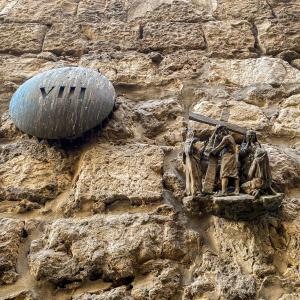
None of the above explains why I would be “brave” enough (as my friend accused) or “stupid” enough (as I would put it) to visit a nation currently struck by a conflict so fierce that the entire world is invested. But the reason is embarrassingly simple.
Religious travel is my passion. On a short list of things I cherish in life, this one sits at the top. It would take another article to map out the sacred places across the 61 countries I’ve been to, but please allow me to shamelessly namedrop some of the locations that are most likely to impress you:
- Giza Pyramids Complex
- Easter Island
- St Peter’s Basilica
- Uluru
- Mahabodhi Temple
- Angkor Wat
- Stonehenge
- Sensō-ji Temple
- Meteora
- Wat Pho
- Four of the Baháʼí Houses of Worship (read my analysis of the Baháʼí Faith)
- Borobudur Temple
- The Satanic Temple
- Chichen Itza
- Taj Mahal
- Hagia Sophia
- Christ the Redeemer
- Machu Picchu
And that is but a few.
Now, if you know anything about this field of travel, it’s that there is one place that out-ranks anywhere else. And that is Temple Mount in Jerusalem. Granted, the Muslim people would argue that Mecca is more important, but even by their traditions, Temple Mount is considered their third holiest site. It is here that the Prophet Muhammad (peace be upon him) briefly ascended into heaven, after all.
Judaism praises Temple Mount even higher as the single most holy spot in that religion. It is believed to be the ground where King Solomon built their First Temple and where Herod built their Second Temple, as well as prophesied as the place they’ll build the final Third Temple when their Messiah arrives. As for Christianity, Jesus confronted the merchants in the once-here Second Temple, flipping tables and causing a scene which led to his ultimate crucifixion.
Simply, no region is so revered by all three of the primary Abrahamic religions, two of which are the biggest religions in the world.
I’d longed to witness this location for years, forever toying with angles and routes which could bring Jerusalem into the mix. But as I watched the situation intensify with flight paths plummeting from the sky, I became aware that my chances may not improve, only worsen. Furthermore, in such an unstable environment, who knows what will be left when everything is said and done? And so, without any political agenda or second guesses for my safety, I dedicated myself to the cause, manoeuvring around the Middle East until I could penetrate the border.
Shout-Out to My Muslim Brothers and Sisters
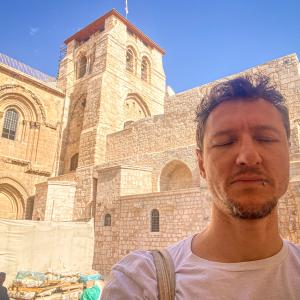
I had my concerns about people’s reactions, but there was only one individual of whom I was profoundly worried. It just so happens that my best friend is a Muslim and an Egyptian. These factors have given him a potent personal perspective on the matter, and he has spoken boldly against Israel long before it became a popular Instagram story to share. I had to chat with him first.
There he was. My bestie. A man more knowledgeable about the conflict than anybody I’ve met. A man who mourns through an educated lens of the Holy Land. And a man who knows me on a level no one else can boast. We connect on a spiritual basis; we’ve discussed religion for hours without ever losing our shared love for God. And so when I finally spoke to him about my decision after practising my speech for days, I was a bucket of frayed nerves. As it turns out, I need not have been. He listened. He nodded. He responded that he understood my reasoning and gave me the requested blessing. The rest of the world’s opinions fell away. If he gets it, then that’ll do.
Funny enough, as this story unfolded and other people threw their two-cent coins at my face, I noticed a pattern. Multiple Islamic friends supported my mission, often with excitement. I suppose if anyone recognises the drive for religious pilgrimage, it is this demographic. The irony is that my Western white friends were exclusively the ones who had a problem. It’s an amusement not lost on me.
Minimising the Ethical Damage
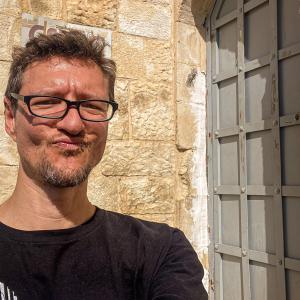
Still, my decision was not guilt-free. Hence, I did everything I could to reduce the chance that my actions would be misconstrued as a statement. What I came up with was to make tiny adjustments to my destinations and vocabulary to favour Palestine over Israel. This shift was not some gaslighting gesture but a verifiable truth. Yes, I landed at Israel’s Ben Gurion Airport, as it is the only entry point through the sky. But while many opt to stay in the more metropolitan comforts of Tel Aviv, I went straight to Jerusalem, which is the capital of Israel and Palestine (as well as the entire Abrahamic world). So yes, pick your side; they are both correct. According to Trump, Jerusalem sits in Israel, and if that’s your tribe, then so be it. But for me, I choose to say I stayed in Palestine because I absolutely did.
Additionally, I booked a hostel in Old City, which is reportedly 77% Muslim. Old City itself is split into four quarters: Muslim, Christian, Armenian, and Jewish. I resided right on the border of the Muslim Quarter. Again, ask those people—the people who live there—where I was. They will tell you I was in Palestine. Maybe you don’t think this softens the blow, but I found a greater peace in this path. I knew the virtuous intention was there, at least.
I have another matter fluttering about my skull that I struggle to articulate, but I will try. Millions of tourists have flocked to this land every year for decades, irrespective of what’s happening. But now that the age-old massacre of human life is a trending topic, and that every government website warns us not to visit, travellers refuse to make the journey. When (or if) things eventually calm down and the news stories focus elsewhere, will those people find it okay to forget this tumultuous period? Will they happily embark on the mission again? I’m sorry, but is that not more problematic?
Personally, the fact that I came here during its most dangerous modern peak shows that I care about this place in a more profound manner, one where politics would not dictate my choices, and one where sharing selective media or posting a line of text with a sad emoji was not enough for me. I had to dive into what was happening with my eyes facing forward.
What Jerusalem Is Like Right Now
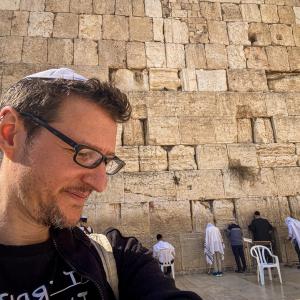
I dove in, alright.
I was immediately punched in the gut with a cocktail of emotions so dizzying that I spent the majority of my stay walking in a daze of disbelief, overwhelmed by a thousand thoughts at once without the chance of catching a single one.
The initial shock comes with the surrealism of a city running its business as usual. People go to the shop, people go to work, and people go out to dinner. In many ways, this strange picture was the most unsettling. If you were ignorant of what was happening, you would have no clue that anything was happening whatsoever.
Except there is something happening. Something major. You know that everyone knows this, and an unspoken sense of unrest buzzes below the surface to the likes I’ve never experienced before. The weight of international focus presses upon you from the sky. I was there when Trump was announced as the next US president, and I heard the cheers from Israel and a grievous moan from Palestine. I was there when Iran’s supreme leader, Ayatollah Ali Khamenei, vowed a “teeth-breaking” response to Israel’s war crimes, with media warnings that it would occur during my stay. You’d be inhuman not to freak out under such strain.
One evening, thunder rolled in the distance, and I panicked, certain a drone strike was imminent. Another morning, I awoke to someone dragging their garbage bin down the cobbled stones, and I nearly roused the entire hostel with screams to run for safety. I have come to accept that these reactions are natural, but they were quickly deflated as I recalled my ex-friend’s comment once again. “…cosplaying a threat to your life while actual people are being slaughtered and massacred with no end in sight.” It was true. Here I was, a victim of mere jump scares. Not far away, families were blown to bits.
So there the brain goes, spinning on overtime. Jesus Christ stood on this spot!/Now, there’s a plain-clothed IDF soldier here holding a machine gun/I can’t believe Trump won/There’s a war going on I should be ashamed of myself for being here/Everyone in Jerusalem speaks really good English/I can’t breathe, I’m so scared of Iran attacking/That’s a beautiful synagogue/Why is this meal so expensive?/I lost a friend because I’m here/Yes, I’m sure many of my friends don’t like me at all right now/Do I even like myself?
It’s a jumble, impossible to maintain stability, so fearfully overwhelming that it should have been unbearable. Except for one thing that kept me afloat. The frequent moments of undiluted bliss that poked through the madness to elate me higher into the “Holy Spirit” than I’ve ever reached before.
The Religious Landmarks
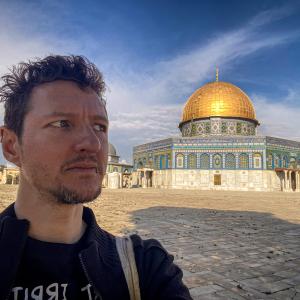
Here is what it’s all about. If you seek holy locations, then take it from someone who has seen hundreds. There is no place more full throttle on the religious pedal than Jerusalem. It is the Holy Land, as stated for millennia, and it lives up to that title. You get the sense that you are walking inside of the Bible. Because you are.
“Ten kav of beauty descended to the world; Jerusalem took nine and all the rest of the world in its entirety took one.” – Talmud, Kiddushin: 49b
Let’s use Patheos itself to gauge the spiritual weight. On their list of The 100 Most Holy Places on Earth, Jerusalem and the surrounding area are featured eight times, four in the top ten. And I visited each of them.
- 42. The Church of Mary Magdalene (built in the general area where Jesus prayed a lot)
- 38. Mt. Zion (referred to in the Bible numerous times, boasting plenty of holy landmarks)
- 25. Via Dolorosa (official path Jesus walked as he carried his cross)
- 15. The Garden Tomb (where some Protestants argue Jesus was buried)
- 10. The Western Wall (a piece of the retaining wall once surrounding the Second Temple, the closest the Jewish people can worship to Temple Mount)
- 7. Church of the Holy Sepulchre (the generally agreed spot where Jesus was crucified and buried)
- 6. The Mount of Olives (mentioned several times in the Gospels, including locations from Jesus’ betrayal and his ascension to Heaven)
Do you hear me? Can you grasp what I am saying? I saw these things. I stood there. Me, a person who lives for sacred landmarks, bathed in that boundless vibrancy, squashed into one week. I wish I could transfer that emotion to you so you’d comprehend what it means to me.
And, of course, there is number 1, Temple Mount. I gazed upon the Dome of the Rock through tears. It is one of the handful of examples where the infinite hype did not lower the experience. On the contrary, it lived up to the Abrahamic promise of exuding an energy I have only touched on several times. In that moment of glory, I understood what the fuss was about.
The Torah. The Bible. The Quran. These are the most significant world-changing books that have sat in our hands. The hugest stories in the history of history. And I walked that.
It changed me in a way that will last me forever, whatever that may mean.
Arabs and Jews
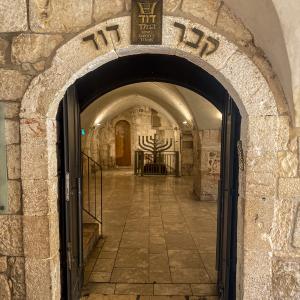
Some deeper presence of God exists in Jerusalem. No one can deny that. Yet therein lies a contradictory thought: how could God possibly live here when you look at what is happening? Such a dark bafflement makes total sense to me now. Jerusalem is special. So special that anyone who has any heritage attached to the place is willing to fight for it. The Israeli/Palestine war does not concern God. It concerns human beings who are completely missing the message.
However, I caught a glimpse of how it would work. The media paints a picture of an Arab vs Jewish society, but Jerusalem Old City is an area of coexistence. Jews and Muslims walk side by side. They chat, they laugh, they trade goods. For the general public of Jerusalem, these divine landmarks are celebrated and shared across dogmas.
Temple Mount is a curious indication of political mutual respect. Israel is the powerhouse of the area. Jerusalem is under Israeli occupation. Temple Mount is the most crucial location in Judaism. And yet, Israel has chosen to largely keep their hands off of the Mount. It is protected as an Islamic ground. Other faiths are disallowed to enter through 11 of the 12 gates, only the tourist one. And there is no praying permitted for anyone but the Muslims. Jewish people are not authorised to worship at their holiest site. They are sometimes even denied entry.
Such seemingly antithetical positions fuel the confusion until you realise that this is a remarkably complex land made of individuals whose stances have been moulded by intense experiences. There is no one-size-fits-all rulebook or philosophy, and I witnessed a broad spectrum.
I conversed with numerous Jewish people. There was a sense of entitlement in some. But I also noted plenty of “Free Palestine” messages on Israeli Tinder bios. In fairness, the Jewish community here is unlike anywhere else in the world. It is the only Jewish state on the planet. I can appreciate why they hang onto it and defend it with all their worth. They literally have nowhere to call their home beyond this area.
I also conversed with many Palestinians. I had never spoken to a Palestinian before. Have you? Have those who judged me? I shared a room with a Palestinian one night. I broke bread with several. I wanted to talk to them about the war, but to do so felt incredibly insensitive. It was as if I were a journalist prying for a story. Or a morbid fan of dark tourism (and I did meet those tourists). Instead, we chatted about simpler things. That was better. And, contrary to what my Western friends will tell you, they were happy I was there.
I saw other things. I met Palestinian Jews. Arab members of the IDF marched past me. At the same time, I witnessed the two-tier society in action. As a South African, I used to think that applying the term “apartheid” to Israel was dramatic, but I see I was ignorant. I, a European-looking tourist, waltzed into train stations while Arabs who lived here were stopped and questioned. But even this is a cycle where oppression breeds insurrection breeds more oppression. None of which settled my uncertainties, only adding to my agonising bewilderment over how this would ever end.
Should You Visit Jerusalem?
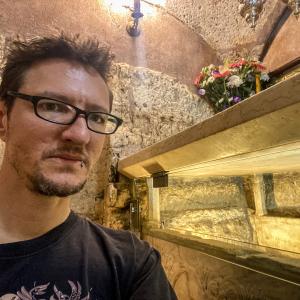
It would be wildly irresponsible of me to recommend anything of the sort.
However, I would like to highlight some of the silver linings of visiting the Holy Land during these troubles.
Every foreigner here is either the most authentic spiritual person you’ll meet or perhaps the most moronic. Nobody makes this mission as a jolly old time. They feel compelled by a godlike urge, whether Jewish, Christian, or Islamic. Consequently, the standard “what’s your name, where are you from” questions quickly turn to God. Each traveller I shook hands with wanted to trade notes on faith. There was a camaraderie spirit that we were the ones who understood what was going on because, unlike the world’s chatter, we actually spoke of Jerusalem in Jerusalem.
Another desirable outcome from an undesirable war is that the usually packed streets have been vacuumed empty. When I visited Temple Mount, there was one other tourist there. I was by myself inside Jesus’ apparent burial cave at The Garden Tomb. I stood alone on the spot Jesus supposedly ascended into heaven on the Mount of Olives. Locals started recognising me. Several nights, I slept peacefully in my dorm, surrounded by vacant beds.
Of course, this lack of tourism leads to the collapse of an entire industry, and so many Palestinian people are desperate. They beg to guide you around the sites. They extend souvenirs, praying for a sale. Shops are closing down; families are on the brink of poverty. Tell me again how my coming here and contributing to these people’s livelihood was immoral. Go on, tell me about it. Look into my eyes as you do so, the same eyes that looked into the eyes of the hopeless Palestinians who depend on tourists to eat. Explain to me how you know more than I do.
My Airport Drama
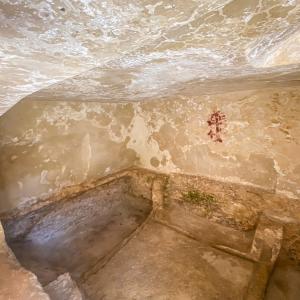
One final note that deserves an entirely separate article is my airport experience when leaving. I was called aside and questioned by Israeli authorities. When the lady learned that my best friend was a Muslim from Egypt, I was suddenly the most famous person in the country. Different scary figures took turns to interrogate me about my Arab bestie and my writing profession for over three hours.
They swabbed every item on me and scanned my body twice. They hand-searched me, including between my toes. They opened my laptop, clicked around my Google Docs, investigated my Amazon history, scoured my Instagram, and read my WhatsApp messages. They eventually allowed me on my flight but not with any electronics, even confiscating my Macbook, promising I’d get it on the other side (which I did). They instructed me not to write about my time in Israel. I told them I wouldn’t. Hahahaha.
I shouldn’t laugh. With an unprecedented number of journalists arrested in Israel recently, I now acknowledge that I was in more trouble than I initially knew. I am grateful to write these words as a free man. Because so many writers were not as fortunate.
Has My Opinion on the War Changed?
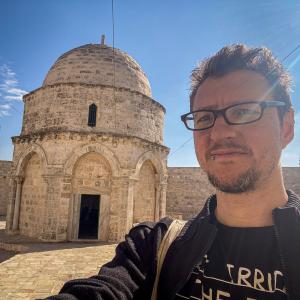
While my core opinion has not transformed, it has been tweaked from every possible angle. Yet I know that documenting those thoughts here would be senseless. Nobody would be satisfied. I wouldn’t convince any minds.
However, what I will say is this: it’s so easy to be pro-Palenstine or pro-Israel from the safety of your own little house as you read the media you’ve selected, which supports your perspective. But do you really think that if you came here to take a long, hard look into the wound of the situation, your firsthand viewpoint wouldn’t shift ever so slightly? Can you truly know about anything until you speak face-to-face with those concerned? Those who criticise my choices do so from a place of lesser education. They have not seen what I have seen. Consequently, the flaccid punch of their scrutiny does not even register.
Nevertheless, I agree that this is not a moment for neutrality. We must stand with those who suffer the most, protecting innocent lives above all else. A ceasefire is the obvious first step to peace. The next step lies in each state, recognising the validity of the other. There are people—human beings—on either side who just want to live in comfort with their families. They want to heal and move forward, which we cannot do as we continue to face backwards.
“In a peace plan, everybody will have to do with less than they deserve.” – Dalia Eshkanazi Landau
My newfound perspective is invaluable, and I have zero regrets. Rest assured that I could have lost 100 friends, I would still have gone. What matter are those who don’t understand me? And rest assured, I could have faced a drone strike and would still have gone. How can I look at myself in the mirror if I do not follow the curious tug of my soul? And now, when I do eventually die, I will have died knowing I stood on Temple Mount.
Irrespective of the climate, religious travel doesn’t make me feel “brave.” It makes me feel fed. If that means I’m a bad person, then so be it. I’m a bad person. But nobody exists on a platform high enough to judge me. It’s between me and God. And I sit closer to that than ever.



